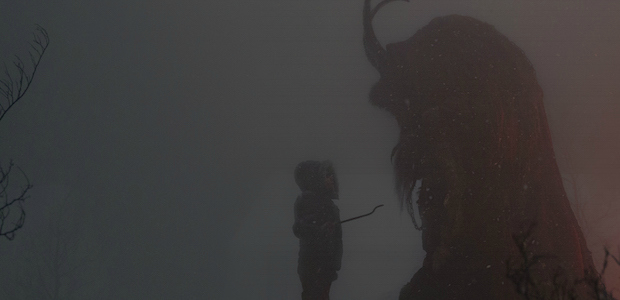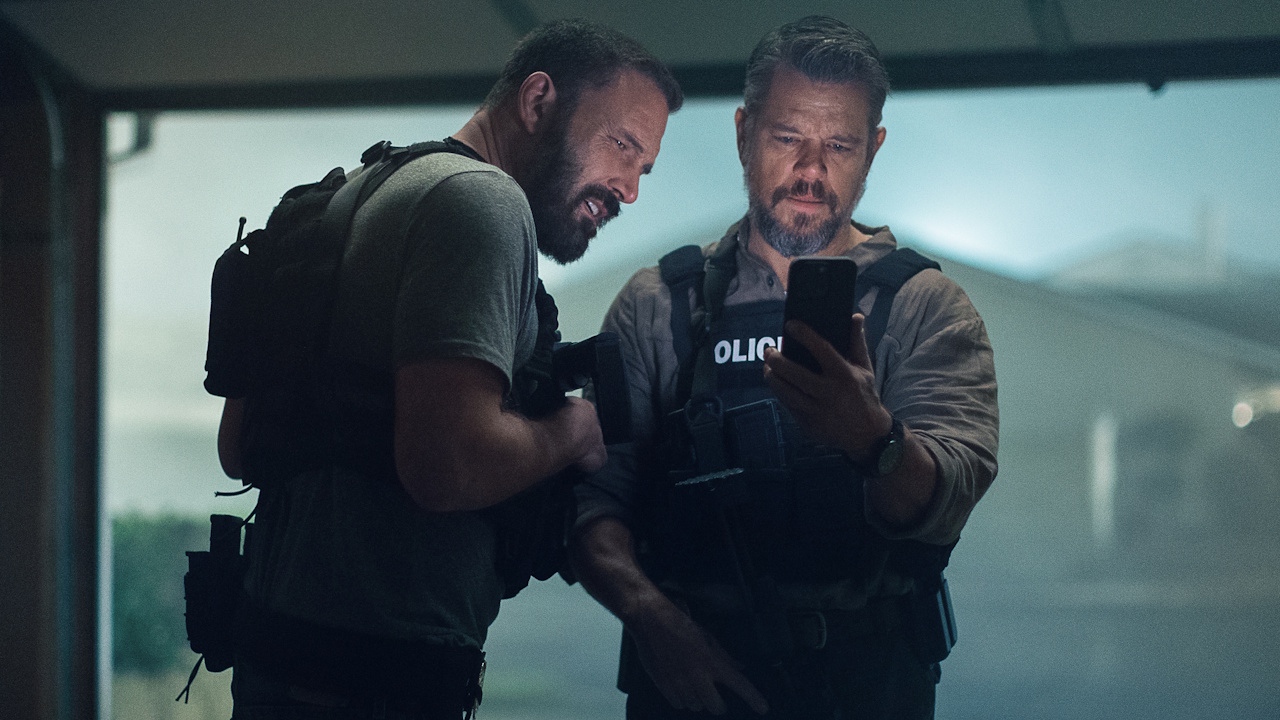When you think of holiday movies, the first things that come to mind are warm and fuzzy stories where, no matter the trials and tribulations, everyone hugs at the end and walks away feeling good, right? But for every Miracle on 34th Street and It’s a Wonderful Life, there is a horror movie that takes a darker side of Christmas, like Silent Night, Deadly Night, Rare Exports, or Christmas Evil. This season, director Michael Dougherty is looking to get in on the act and do for Jesus’ birthday what he did for Halloween with Trick ‘R Treat, with his new horror comedy Krampus. The results are mixed at best, and something of a tonal mismatch.
Krampus putters along for a while with the story of a dysfunctional, mismatched family begrudgingly gathering together for an attempt at holiday cheer. There’s dad, Tom (Adam Scott), mom, Sarah (Toni Collette), daughter, Beth (Stefania LaVie Owen), and the son, Max (Emjay Anthony), who, though he knows Santa is total BS, still believes and clings to the true Christmas spirit. Then there’s the stereotypically shitty redneck in-laws: Howard (David Koechner), Linda (Allison Tomlin), and their kids that don’t really matter because they only exist to be terrible.
They also live with Tom’s German mom, Omi (Krista Stadler), who, when things start going south, knows what’s really going on, but only chooses to share when it’s too late to do anything proactive. Though when she does reveal what she knows, she does it in a Coraline-esque animated flashback scene, so there’s that.
Getting the whole family together is little more than a set up to let you know that Tom and Sarah have issues and for the ultra-manly, Hummer-driving, shotgun-toting Howard to question Tom’s manhood. You’ve been through all of this many times before, and the cast is far too good to be wasted on this bland, tedious set up. It’s not the worst thing you’ve ever seen, but full of obvious, too-easy jokes, neither is it interesting in any way, and the script from Dougherty, Todd Casey, and Zach Shields gives them nothing memorable to do.
However, after awkwardly bumbling around for a while, trying to increase the tension by introducing the idea of Krampus, a kind of horned, cloven-hooved anti-Santa Claus who shows up when all hope and Christmas cheer is lost, things take a wingnut turn and go completely off the deep end, in the best possible way.
Once Krampus moves beyond the tedious, predictable set up, shit gets all kinds of crazy. On his own, the titular monster is a dark, sinister figure feeding on misery, and there’s definite promise in the legend. But he is also far from alone in his quest, and his henchmen are gleefully demented, or as Howard says, “Twisted, fairytale horseshit.” We’re talking a kid-eating Jack-in-the-Box, demonic gingerbread men wielding a nails gun, and a teddy bear with far more teeth than you expect. Then there’s his cadre of dark elves, which, more than creatures, resemble little dudes in creepy masks, lending a sinister air to the manic insanity. In all honesty, his underlings do most of the dirty work, including chimney fishing for a fat kid (it makes sense when you see it), while the big guy, in true supervisor fashion, just kind of hangs back orchestrating it all and looking scary.
All of this mayhem isn’t enough to entirely save Krampus, which ends with a whimper, wrapping up in appropriately bland fashion. Though there’s nothing particularly scary, especially for even a moderately seasoned horror fan, there are a handful of eerie practical special effects, and while you’re in the middle, it’s goddamned fun.
Your Daily Blend of Entertainment News
There are enough fantastic, frantic, entertaining-as-hell elements in Krampus—once it hits its stride, it’s not afraid to feed small children to flesh-hungry monsters— that, as great as they can be in the moment, primarily serve to show you what could have been. There’s basically an act’s worth a madness and frenetic disorder, propped up by two of dreary tedium.
This could have been a new, left-of-center holiday classic in the vein of Gremlins—the potential is there—but with the pat, we-need-to-remember-how-much-we-really-love-each-other platitudes, the tacked on postscript ending, and insipid set up, there’s little more to cling to than a few brilliantly insane moments. That’s not enough to make it a new classic or a must-watch, but for some of you this will be a welcome treat sitting underneath your cinematic Christmas tree this holiday season.


